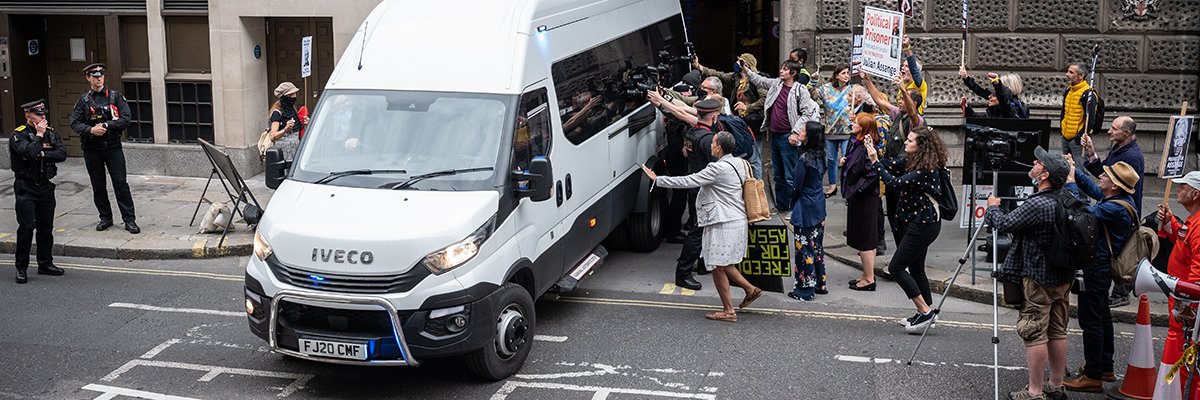Julian Assange would be held in the same US jail as convicted terrorist Abu Hamza, with no contact with other inmates and only one phone call a month in a US jail, a court heard today.
Lindsay Lewis, a US lawyer, told the Old Bailey that Assange was likely to be confined in the same supermax prison in Florence, Colorado as Hamza and held in similar conditions of isolation.
She told the court that the prison had a poor record on healthcare.
Hamza had not received adequate healthcare for conditions including diabetes, a double amputation of his forearms and dental problems caused by being forced to open tin cans with his teeth, she said.
Lewis was speaking on the 14th day of Assange’s extradition trial at the Old Bailey.
The 49-year-old founder of WikiLeaks faces one count under the Computer Fraud and Abuse Act and 17 counts under the Espionage Act. He faces a maximum sentence of 175 years.
Assange ‘recruited hackers’
Assange is charged with obtaining and publishing tens of thousands of classified documents from former soldier Chelsea Manning in 2010, including reports on the Afghan and Iraq wars, Guantanamo Bay detainee assessments and US State Department cables.
A US federal grand jury also alleges that Assange sought to recruit hackers at conferences in Europe and Asia to provide WikiLeaks with classified information, including military secrets.
Giving evidence, Maureen Baird, former warden of New York’s Metropolitan Correction Centre (MCC), told the court today that Assange would be placed under special administrative measures (SAMs) and confined to a cell for 23 to 24 hours a day for national security reasons.
After a trial in the US, Assange would be held at the maximum security prison ADX Florence in Colorado – the prison that holds Abu Hamza al-Masri, also known as Mustafa Kamel Mustafa, she said.
Baird, who said she had often met with prisoners under SAMs, said the prison regime damages the physical and mental health of inmates.
“It causes severe depression, anxiety, paranoia, weight loss detrimental to physical health and detrimental to mental health,” she said.
The defence witness said that SAMs prisoners would have to be “almost dying” before they could be transferred to a medical facility.
Baird said there were two staff on the SAMs unit in the MCC when she was warden and they did not engage with inmates.
“There is a steel door and a viewing slot,” she said. “That slot remains closed at all times except when an officer makes rounds every 30 minutes. That is when they would open the viewing slot, see if the person is OK and move on.”
The US Bureau of Prisons has a robust suicide programme, said Baird, but it is not effective if someone is determined to take their own life.
“When you have suicidal ideation, the reliance on inmate self-reporting is pretty strong,” she said. “When an inmate fails to report that, it is not noticed and the inmate commits suicide.”
US said it would not put Hamza in supermax
Lewis, who represented Abu Hamza, told the court that the US had told the UK courts during his extradition hearings that Hamza would not be sent to the supermax in Florence for more than a short time.
But despite those representations, he was sent to ADX Florence and has been held there in isolation for five years, she said, adding: “He was almost never out of his cell except for legal visits.”
Assange, who has recurring depression and has been diagnosed as being on the autistic spectrum, is charged with national security offences and unauthorised receipt of classified documents.
He would be on SAMs during pre-trial and post-trial detention in the US, said Lewis.
A prisoner would have to have a serious mental illness to be transferred to a medical facility from ADX Florence, she said. “Even then, they may have to be placed at the ADX because of lack of other facilities.”
Assange would be subject to the same conditions as Abu Hamza, spending the entire day completely alone with no contact with other prisoners, she added.
Long appeals process
Lewis said it was extremely difficult for prisoners to challenge SAMs. Inmates have to go through a long drawn-out process, filing complaint after complaint through internal administration appeals before they are allowed to raise matters in court.
“I don’t know of any administration appeal that has been successful,” she said.
Hamza did not receive mental or physical healthcare, she said. “He is in an abysmal condition.”
Lewis said Hamza was being held in a cell for handicapped people that was unsuitable for him. He had amputations and diabetes, she said. “He was being forced to do things that he should not do and his wounds did not heal.”
Hamza had dental problems because he had to open cans with his teeth, said Lewis. “That affects him on an extreme level.”
Lewis said Hamza had been under SAMS for eight years post-trail and pre-trial.
On one occasion, he was told he would be on SAMs for another year because he had made an “unapproved contact” by asking an approved contact to pass on a message: “Tell my one-year-old son that I love him.”
Lewis said she had not always been able to visit Hamza as his attorney. “There were many times I was turned away because the two visiting rooms were in use by counsel, or there were lockdowns, and for various other reasons,” she added.
US did not break undertaking to UK
Cross-examining, Clair Dobbin for the prosecution said the US had not made an undertaking to the UK not to place Hamza in ADX Florence.
She read a declaration by a warden that Hamza would undergo a medical examination and would go to a medical facility if he could not manage his activities of daily living.
“There is no way they could have found he could have managed his activities of daily living either pre-trial or post-trial,” she said.
Lewis said the fact that Hamza had amputations of both forearms alone meant that he should not go to the ADX. “I don’t believe the US government has followed through on him receiving a full medical examination,” she said.
Dobbin questioned whether Lewis had simply taken Hamza’s word about his medical treatment.
Lewis said there were a number of things beyond dispute. “He is a double amputee,” she said. “He does not have the daily nursing care four times a day he had in the UK. He is placed in a handicapped cell that does not have proper shower and toilet facilities.”
Ex-warden accused of failing to act on SAMs prisoners
Dobbin questioned why Baird had not done anything to make the conditions of SAMs prisoners more tolerable during her time as warden of the Metropolitan Correction Centre.
Baird said she tried to lead by example by talking to inmates, but could not impose that on her staff. “It was not uncommon for staff not to engage with inmates,” she said.
The former warden agreed she had not complained about the conditions of SAMs prisoners to the Bureau of Prisons or a judge. But she denied suggestions from Dobbin that this meant she was not concerned about the treatment of SAMs prisoners.
“It did cause me concern, but I had to convince myself it was OK,” she said. “I honestly did not believe I could do anything. It was [handled] at a higher level.”
Dobbin suggested that prisoners could take part in a three-phase programme that allowed their SAMs conditions to be changed and could meet in groups of four in the area outside their cells when they reached level three.
But Baird said the phases had nothing to do with removing SAMs. Phases one and two gave extra privileges, but prisoners were still housed in isolation.
“There are likely [to be] few inmates that make it to level three because it defeats the whole purpose of SAMs,” she said. “It completely goes against what SAMs does.”
Dobbin quoted a statement from prosecution witness Alison Leukefeld, who works for the US Bureau of Prisons, saying that SAMs prisoners have the opportunity to engage in group therapy.
Baird said: “I think she does not have very much experience with SAMs inmates and is not out in the field.”
The court heard that during Baird’s time as warden at the MCC in New York, prisoners on SAMs were only allowed to spend an hour in a recreation cell for exercise.
“There was no exercise equipment at all,” she said. “I had an exercise bike brought in. It was just an empty cell.”
They were held in a unit called “10 cells”, originally designed after 9/11 for prisoners from Guantanamo Bay, said Baird. Prisoners were allowed one half-hour phone call a month to an approved family member, or two 15-minute calls.
“The phone calls were always monitored in whatever language they spoke by an FBI agent,” she said. “They had to request the phone call two weeks in advance.”
All mail coming in and out to SAMs prisoners is screened and could sometimes take “a couple of months” to arrive, she added.
The case continues.













